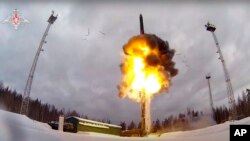The International Campaign to Abolish Nuclear Weapons (ICAN) says African countries should join the campaign to abolish the use of nuclear weapons by signing and ratifying the Treaty on the Prohibition of Nuclear Weapons (TPNW).
VOA’s John Tanza spoke with Seth Sehlden, the United Nations liaison for the group, who says the threat of nuclear war is growing on the backdrop of Russian threats to use nuclear weapons in its war with Ukraine.
The Interview was edited for brevity and clarity.
VOA: What is the importance of campaigning to ban nuclear weapons at this time?
Shelden: Nuclear weapons have been around for over seven decades and there's been an effort even since the very beginning of the United Nations. The very first resolution the United Nations voted on was to work toward resolving nuclear weapons, and to figure out a way to protect the world from someone else using them. And we engaged in many processes to get nuclear armed states to embrace disarming.
We see ourselves in 2022 no safer than we were. In fact, many experts would say today is the most dangerous time for nuclear weapons to be used - and non-nuclear weapon states recognizing that the nuclear arms states were not taking us to where we needed to be.
VOA: Tell us about your encounters with African countries when you try to bring them on board to join the campaign for the ban on nuclear weapons?
Shelden: Largely we've seen over and over again that these states they were being held hostage by nuclear states that start wars using these weapons as shields. With Russia attacking Ukraine and holding the whole world hostage by the food supply and the refugee crisis, African states are keenly aware of the role that the nuclear hierarchy plays.
South Africa along with Nigeria are part of the core group of states that brought about the negotiations for the TPNW. And they have in no uncertain terms referred to the nuclear world order as Apartheid—the haves and have nots.
VOA: What is preventing the banning of a nuclear weapons? Why is it not done yet?
Shelden: Because a small number of leaders and a small number states see it as in their interests to perpetuate the existing world order to continue to have them and to continue threatening to use them. But I think that finally there's a mechanism for which states can voice their opposition to the status quo and find a new way forward to bring us to a safer future.
VOA: You're bringing this topic now on the backdrop of what is happening after Russia invaded Ukraine and it is threatening to use nuclear weapons. Is this something that African countries should take very seriously?
Shelden: Because we haven't seen nuclear weapons used in war since 1945 means that a lot of states and a lot of us who were not around in 1945 may not fully understand what these weapons are and what they can do. We've seen over 2000 nuclear weapon tests that have irradiated communities and destroyed lands.
We have seen new data showing what the consequences of a nuclear exchange would be. Some of the studies show that up to five billion people are at risk of starvation in the event of a war between the US and Russia. The radiation effects [of a nuclear exchange] are well known. The immediate blast would incinerate everyone in the vicinity. The radiation, depending on which way the wind blows, will continue to kill people potentially for generations.
But even greater is the risk of a "nuclear winter." In the event of the use of a nuclear weapon, the resulting cloud that form from the ash and debris that would be lofted high in the upper atmosphere beyond where the rain and precipitation could take it away fast enough, would cause cooling that would that could last for seasons to come and that could destroy crops. And all around the world and disrupt the global food supply.
